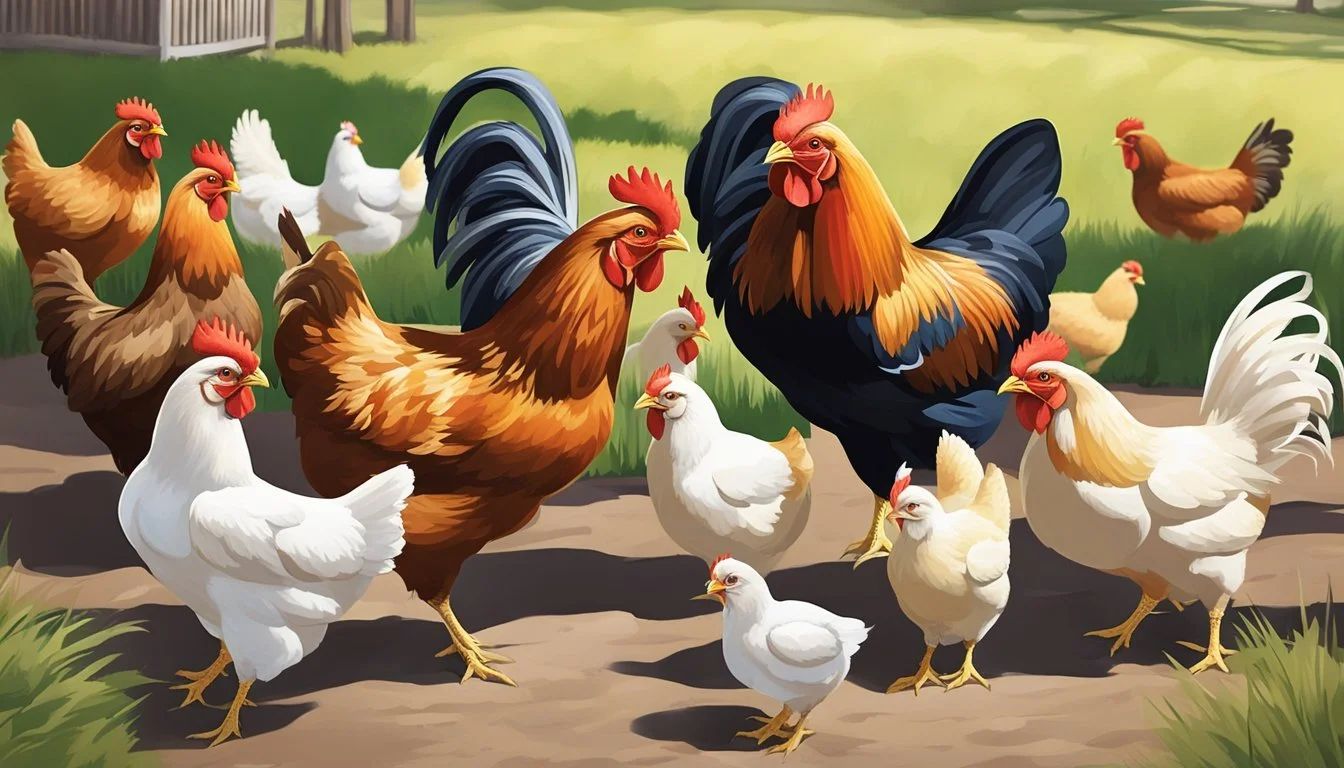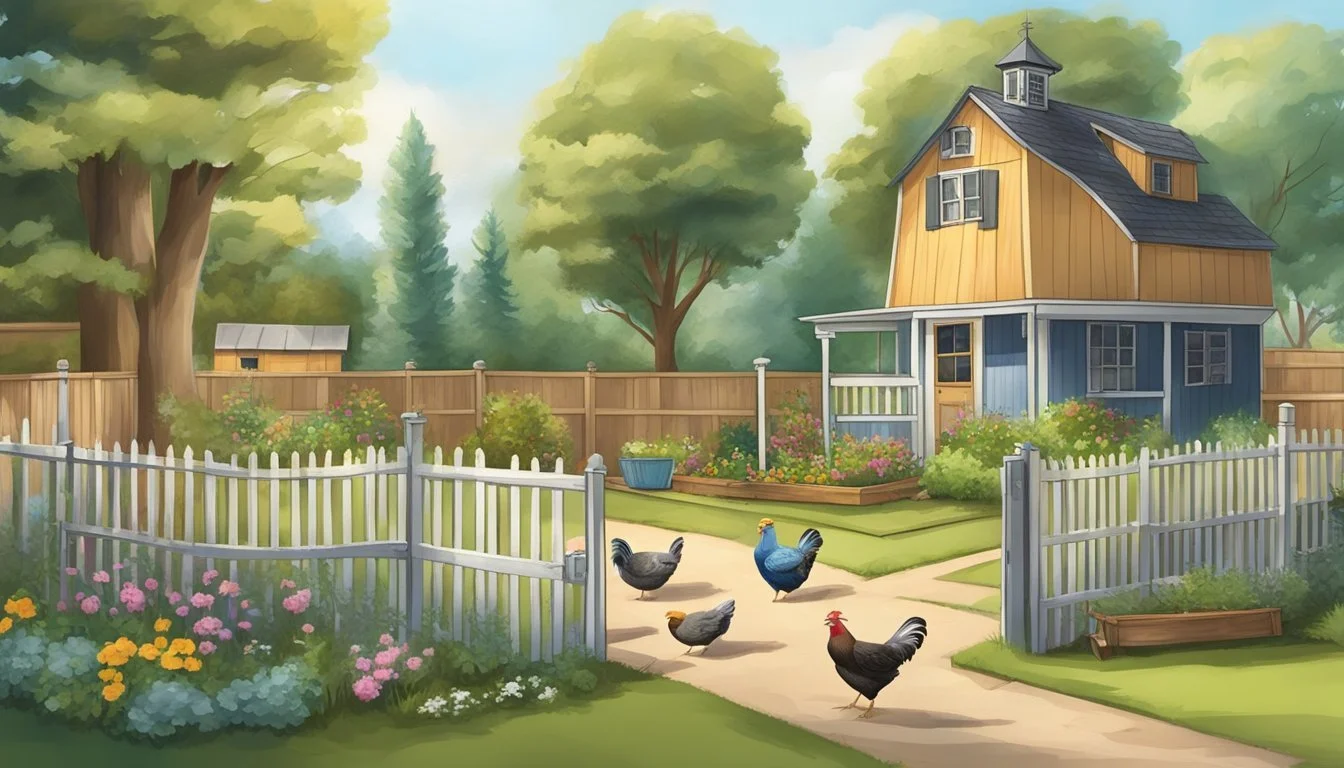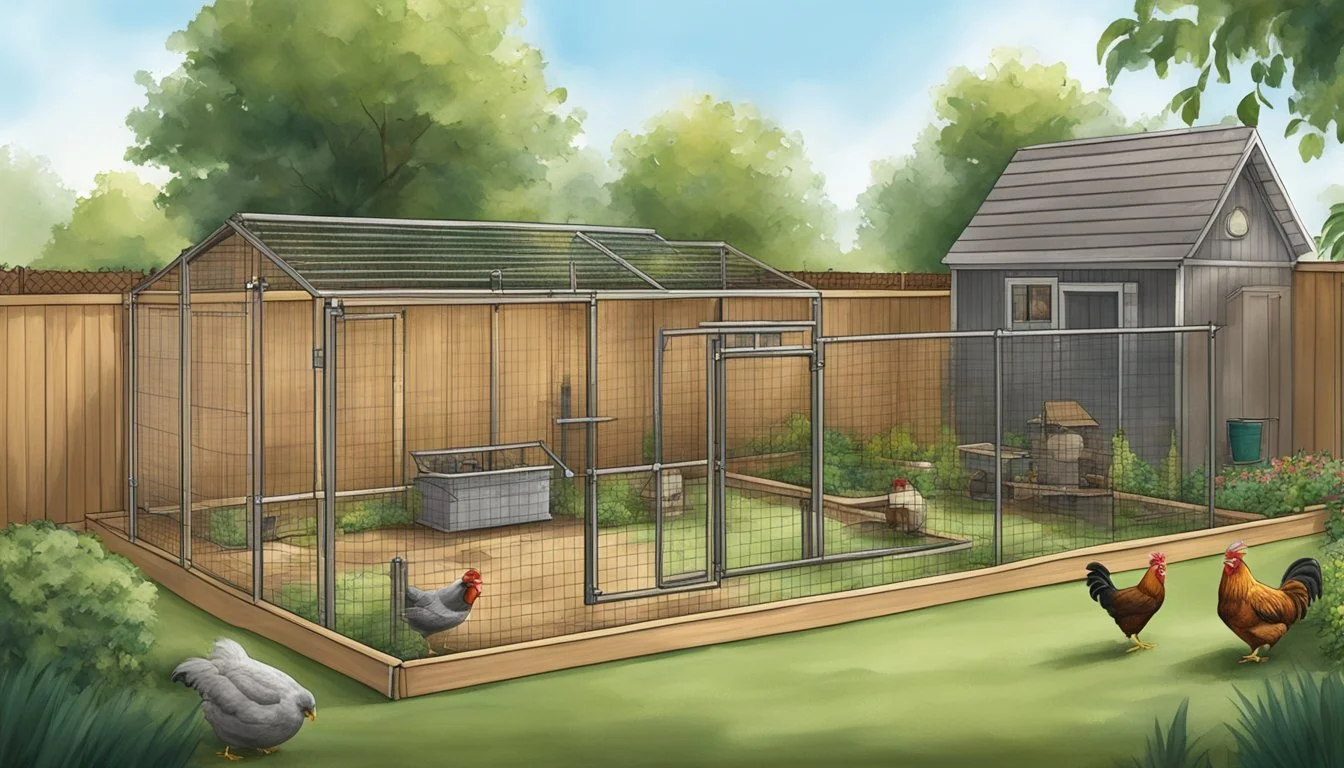Keeping Backyard Chickens in Meridian, ID
Essential Tips for a Healthy Flock
Keeping backyard chickens has become increasingly popular among residents of Meridian, Idaho, serving as both a source of fresh eggs and a way to teach responsibility to household members. The city's stance on urban poultry farming is accommodating, allowing individuals to engage in this practice with specific guidelines in place. Those looking to join the community of backyard chicken keepers are not required to obtain a permit, making it a relatively straightforward endeavor.
In Meridian, the primary conditions for maintaining a backyard coop are centered on sanitation and reasonable treatment of the birds. Regulations are designed to ensure that not only are the chickens kept in humane conditions, but also that the potential for noise or disturbances to neighbors is minimized. While roosters, which are often associated with early morning crowing, are not prohibited within city limits, chicken enthusiasts are encouraged to consider the impact on their neighborhood.
It is important for potential chicken keepers in Meridian to familiarize themselves with local regulations such as coop placement and the number of hens allowed. Coops must be placed in the backyard, meeting specific setbacks from property lines and neighboring homes. Adhering to these regulations helps maintain a positive relationship with surrounding residents and supports a thriving community of backyard chicken enthusiasts in Meridian.
Understanding Local Ordinances
For Meridian residents considering keeping backyard chickens, it's crucial to be familiar with the local city ordinances that govern such activities to ensure compliance.
Meridian Chicken Ordinance Overview
The city of Meridian, Idaho, allows residents to raise backyard chickens under certain conditions. It's essential to note that these conditions are focused on maintaining sanitation and reasonableness without causing nuisance.
No Permit Required: Residents do not need a permit to keep chickens.
Sanitation and Noise: Conditions should remain sanitary, and noise levels must be considerate of neighbors.
Limits on Chickens and Roosters
The regulations in Meridian are quite lenient regarding the number of chickens:
Chickens Allowed: Unlimited number, as long as conditions are sanitary.
Roosters: Not prohibited within city limits, but local norms should be respected to minimize disturbances.
Property Requirements and Restrictions
Although there is no specific number of chickens stated, there are guidelines concerning their housing:
Coop Placement: Coops must be kept in a manner that respects zoning guidelines and maintains a reasonable distance from property lines.
Other Localities in Idaho
Chicken keeping laws can vary considerably across Idaho:
Caldwell, Coeur d’Alene, Idaho Falls, Nampa, Pocatello, Post Falls, and Twin Falls: Each locality has its own set of rules, which may differ from Meridian's ordinances.
Local Laws: Always check with your specific city and county clerk for the most accurate information regarding backyard chicken regulations.
Keeping chickens in Meridian requires attention to local regulations to ensure the health and safety of the animals, the community, and the satisfaction of neighbors. For the official municipal code or to address specific concerns, it's wise to consult the Meridian local government.
Choosing the Right Chicken Breed
When selecting chicken breeds for backyard coops in Meridian, ID, one needs to consider the climate, available space, and desired egg production to ensure a harmonious fit between chickens and their caretakers.
Best Breeds for Backyard Coops
Backyard chicken enthusiasts have an array of breeds to choose from, each with unique characteristics. When considering the best breeds for a Meridian backyard coop, factors such as climate adaptability, space requirements, and the breed's temperament should be taken into account.
Lohmann Browns: These are industrious layers, offering impressive egg production of over 300 eggs annually. They are well-suited to the Meridian climate and are often regarded for their reliable laying ability.
Standard Large Fowl: These birds are typically the image that comes to mind when one thinks of chickens. With hens weighing approximately 4-10lbs and roosters around 5-13lbs, they are a good fit for standard backyard coops, providing both eggs and meat.
Bantams: Smaller than standard chickens, Bantams require less space, making them an excellent option for backyard flocks with limited room. Despite their size, they still offer a variety of egg colors and can be quite personable.
It's essential to ensure that any chosen breed has sufficient space as per Meridian regulations, which stipulate that coops should have a minimum of 3 square feet per chicken indoors and runs should provide at least 10 square feet per chicken outdoors. This guarantees a high quality of life for the chickens and a more manageable coop for the owner.
Setting Up Your Chicken Coop
In Meridian, ID, ensuring you have a well-constructed and maintained chicken coop is pivotal for the health and safety of your backyard chickens.
Essential Coop Features
Size: Each chicken requires at least 3 square feet of space inside the coop. For a well-organized space, here are the features to include:
Ventilation: Coops must be well-ventilated to prevent respiratory issues.
Nesting Boxes: Provide one nesting box for every four hens.
Perches: Install perches for roosting, allowing 8-12 inches per bird.
Security: The coop should be predator-proof with locks and durable materials.
Coop Placement and Construction
Location: Place your coop in a high, well-drained area to avoid flooding. You should maintain these setbacks:
Distance: Keep the coop at least 20 feet away from your house for odor management.
Sunlight: Position it to get adequate sunlight, which is essential for the chickens' health.
Materials: Use sturdy, weather-resistant materials for construction. Cedar and redwood are excellent for resistance to rot and pests.
Maintaining Safety and Sanitation
Hygiene Practices: Regular cleaning prevents disease and keeps the coop odor-free. Key tasks include:
Litter: Replace bedding materials monthly or as needed to keep the coop dry.
Waste Management: Set up a system for manure removal to maintain sanitation.
Health Measures: Inspect your chickens regularly for any signs of disease. A clean coop contributes significantly to overall poultry health.
Raising and Caring for Your Chickens
Raising backyard chickens in Meridian, ID, combines the satisfaction of caring for animals with the practical benefits of fresh eggs. Proper feeding, healthcare, and management from chicks to pullets are essential for successful poultry keeping.
Feeding and Health
Chickens require a balanced diet to maintain good health and consistent egg production. Provide a mix of chicken feed, grains, and kitchen scraps to ensure they receive adequate nutrition. It is critical to maintain clean water sources to prevent disease.
Daily diet for chickens:
Layer feed: 16-18% protein
Grit: aids in digestion
Calcium: for strong eggshells
Fresh greens: for extra nutrients
Monitoring for signs of illness is also necessary. Watch for changes in behavior, appetite, and egg production, which can signal health issues.
Raising Chicks to Pullets
Raising chickens starts with caring for chicks properly. A warm, secure brooding area is necessary until chicks develop feathers and can regulate their body temperature. Transitioning from chick starters to growers feed is essential as they mature.
Chick to pullet timeline:
0-6 weeks: Keep at 95°F decreasing 5°F each week
6-20 weeks: Gradually introduce grower feed
Ensuring Proper Handling and Care
Handling chickens with care is important for their well-being and to maintain a calm flock. Chickens need a safe and clean environment. Regular coop maintenance prevents parasites and diseases. Hens require nesting boxes for egg-laying; one box per 4-5 hens is recommended.
Habitat requirements:
Clean, ventilated coop
Secure from predators
Nesting boxes with straw
Adequate space: 2-3 square feet per chicken inside the coop
Education on proper chicken care is crucial. Owners should keep up-to-date with best practices for chicken health, housing, and sanitation to ensure their flock thrives.
Navigating Legal and Neighborly Concerns
When keeping backyard chickens in Meridian, ID, residents should be aware of the local regulations and the importance of fostering amicable relationships with their neighbors. Careful adherence to laws and clear communication are crucial.
Compliance with Local Regulations
Residents of Meridian, Idaho can keep an unlimited number of chickens on their property without a permit. However, it's essential that the conditions are sanitary and reasonable to comply with the municipal code. While roosters are not prohibited, it's advisable to check any specific local ordinances and regulations regarding livestock within residential areas. Residents can examine the Meridian City Code online, or inquire with the county clerk's office via email for detailed information.
Check Online: Meridian City Code for the latest updates on backyard chicken regulations.
Local Government Inquiry: Contact the county clerk's office by email for specific ordinance information.
Maintaining Good Relationships with Neighbors
Ensuring the health and safety of backyard chickens can mitigate concerns related to neighboring properties. It's recommended to design and maintain a coop that minimizes odor and noise, which are common concerns. Additionally, proper waste management is critical to maintain sanitary conditions and to prevent any potential disputes arising from odors or pests that could affect neighbors.
Considerate Coop Placement: Position the chicken coop away from neighboring property lines.
Sanitation: Implement regular cleaning schedules to manage waste efficiently.
Communication and Resolving Disputes
Even with regulations allowing backyard chickens, conflicts with neighbors can occur. To address any concerns, open lines of communication are valuable. Residents may choose to discuss their chicken-keeping practices with their neighbors and address any concerns promptly. If disputes arise, the local government may provide mediation services to resolve issues collaboratively. It's also wise to check whether any Homeowners Association (HOA) rules might impose additional restrictions beyond local laws.
Direct Communication: Engage in open conversations with neighbors about your chicken-keeping practices.
Mediation Services: Utilize local government resources to assist in resolving disputes amicably.
Additional Resources and Support
Those interested in urban chicken keeping in Meridian, ID, have a wealth of resources at their disposal to ensure they are informed and compliant with local regulations. The community benefits from educational workshops, online forums, and literature dedicated to responsible backyard poultry care.
Local Workshops: Workshops, such as those presented by backyard chicken advocates, provide families with essential knowledge on chicken keeping. These events often cover topics like coop construction, chicken health, and local regulations.
Meridian Library District: Offers informative sessions on chicken care.
Local Farming Co-ops: Host periodic educational events and provide a platform for community discussion.
Online Resources:
ChickenLaws.com: Presents up-to-date information on local ordinances pertaining to backyard chickens.
BackYard Chickens Community: A comprehensive online forum where residents of Meridian connect with fellow chicken enthusiasts to share advice and experiences.
Literature: Numerous books and guides written by backyard chicken experts offer in-depth information that ranges from beginner to advanced techniques.
The Backyard Chicken Fight by Gretchen Anderson is recommended for its local relevance.
Support Groups: Local support groups provide advice and camaraderie amongst Meridian's chicken keepers. They may be found through social media platforms or local community bulletin boards.
By leveraging these resources, individuals in Meridian, ID, can make educated decisions about urban chicken keeping, ensuring a harmonious existence with their feathered pets as well as adherence to United States regulations relating to poultry in an urban environment.






